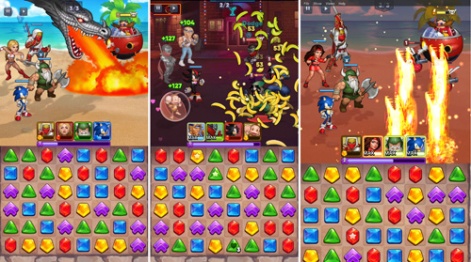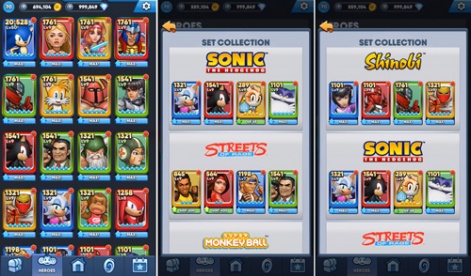Does the world need another midcore match-three mobile game?
No, it does not, but that doesn’t stop developers attempting to mix accessible gameplay with the long-term engagement that comes from a deeper metagame.
In that context, a more interesting question is why do developers think their midcore match-three game will find that elusive crossover audience when so few such games have done so?
In the case of US studio Demiurge Studios, its answer is two-fold.
It has previous experience as the developer of high acclaimed match-three RPG Marvel Puzzle Quest, and because its parent company is Sega, it also has access to some of the most recognisable game characters of all time.
Still, according to GM Bart Simon, when the idea for Sega Heroes was pitched to it, the team’s consensus was ‘Are we actually allowed to do that?’
Finding the balance
They were, and the end result is something that could only be released as a mobile game. Which isn’t to say the concept was easy to flesh out.
“Marvel Puzzle Quest is a very deep hardcore game,” Simon explains. “We’ve been running it for six years and expect to run it for another 10.
“On the other hand, Sega Heroes is designed to be a lighter experience. Of course, you need awesome gameplay but you need to make sure you’re not turning players off.”

The players weren’t the audience Demiurge were worried about though when it started designing the game, however.
With access to Sega’s entire character set, it was also nervous about creating an underlying context that worked for all games it was pulling IP from; Jet Set Radio and Phantasy Star to Streets of Rage, Shinobi and (in future) many more.
Our aim is to keep the game charming, a happy space in which to spend time.Bart Simon
Of course, with a western focus in mind, it was little surprise the signature characters are from the Sonic and Monkey Ball games.
And as well as the clean, cartoony aesthetic, this atmosphere is reinforced by the sparky dialogue between characters, which while humorous maintains a level of cohesion not always found when a cast of diverse characters are brought together.
“Our aim is to keep the game charming, a happy space in which to spend time,” says Simon.
“It’s familiar in terms of the match-three but because of the RPG elements, the match-three is also part of a broader, deeper game.”
Launch, improve, repeat
Of course, launching a great game is only the start of the battle, especially when it comes to the ultra- competitive free-to-play mobile space. What happens next is crucial.
“One of the hardest things has been to prioritise the features we want to include,” Simon states.
“The launch needs to be awesome, a fully formed product, but then it’s a case of learning, iterating and releasing more content. We have hundreds of ideas.”

And yet once a game launches, by necessity the developer has to ceed some control to the players, which for a game like Sega Heroes, can be resulted in mixed signals.
“We’d love the game to be everything to everyone but different types of players like different goals,” Simon confesses.
“It does have a robust metagame, so we expect some of the more casual players to churn out.”
Part of the process of finding out whether the game will skew more casual or more midcore will come down to marketing. Simon also hopes the introduction of new features including more social elements such as Guilds, due in 2019, will create a product offering much more than a quick session of Candy Crush Saga.
Similarly, as live ops kicks into gear, Sega Heroes will be able to react to whatever’s going on in the wider world of Sega, whether that’s the release of the Sonic movie or the much-anticipated release of Shenmue III.
Perhaps only then will Demiurge learn whether 'just another midcore match-three mobile game' can break through the app store noise and become something significant.





















